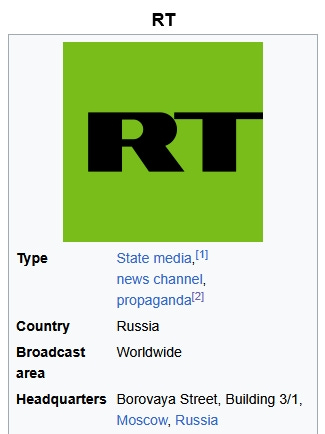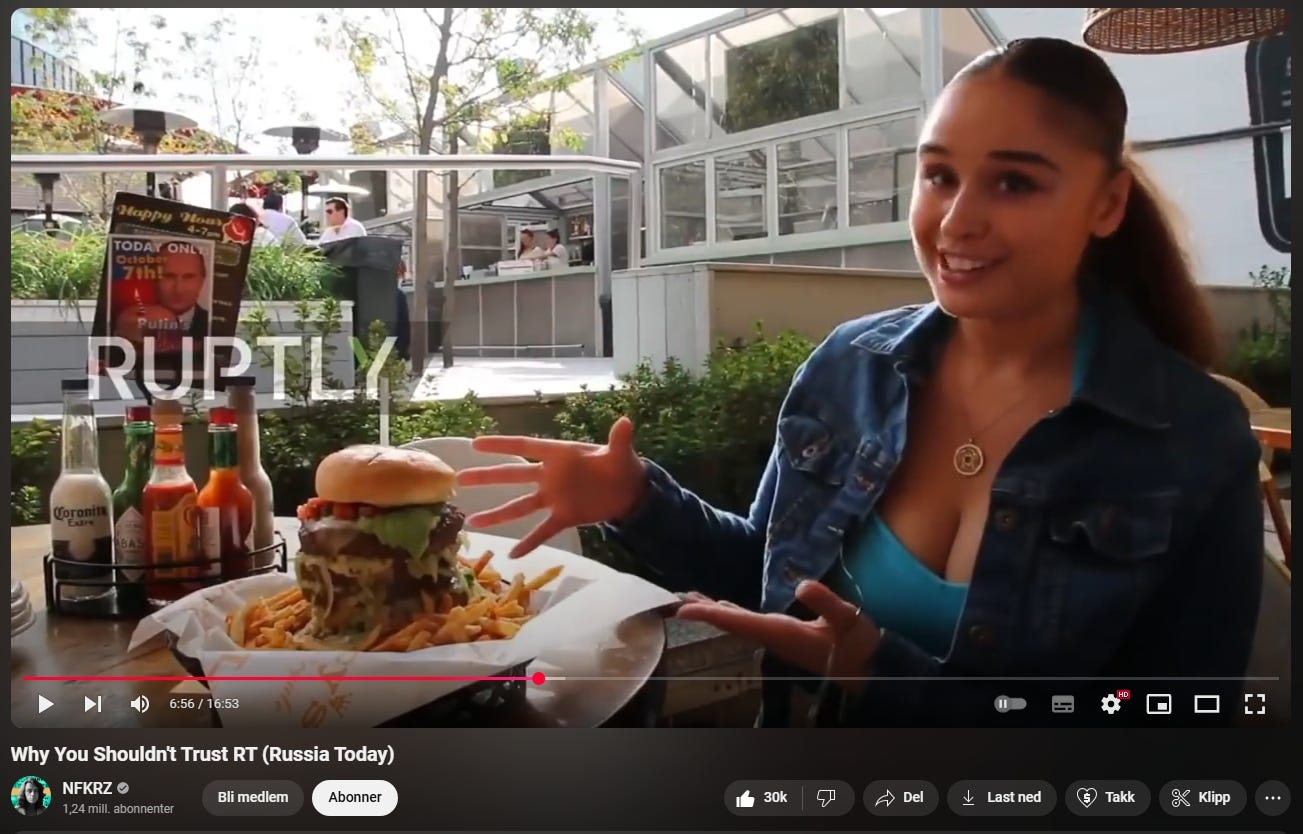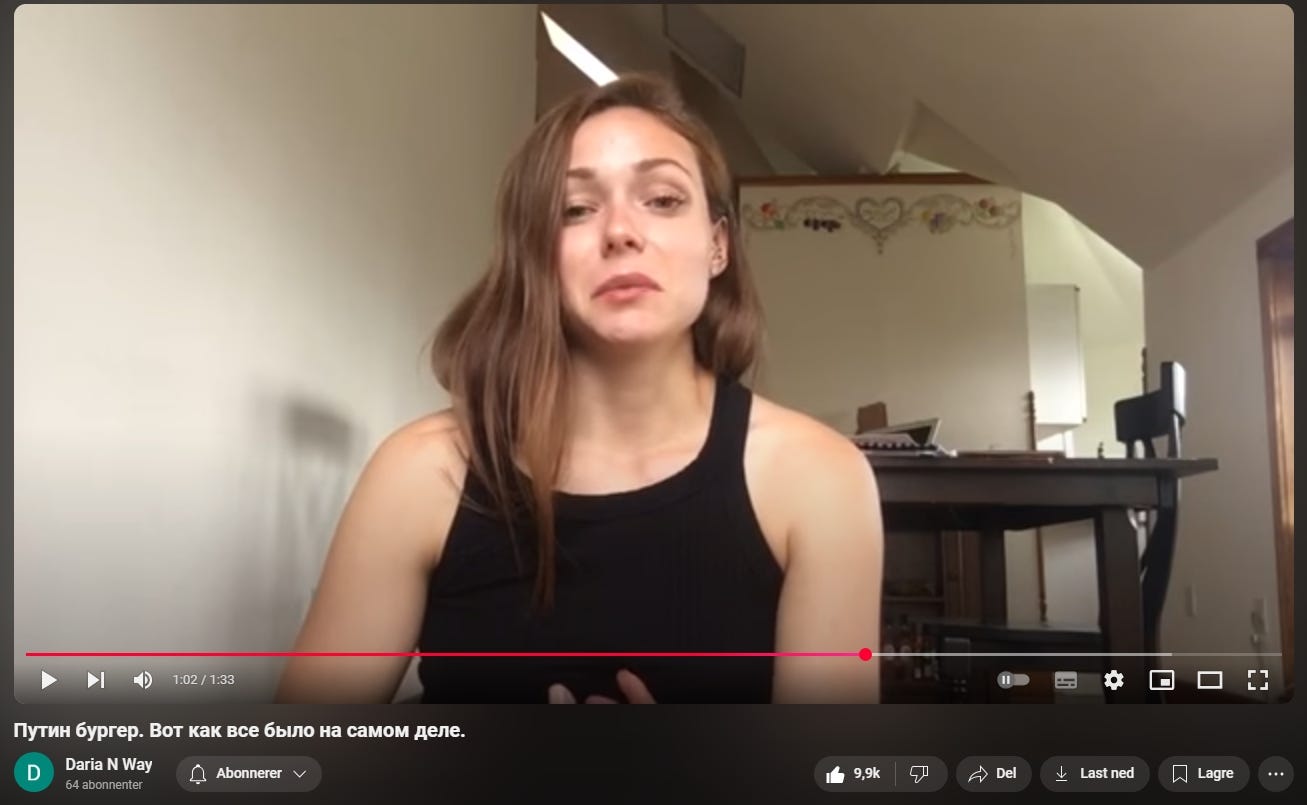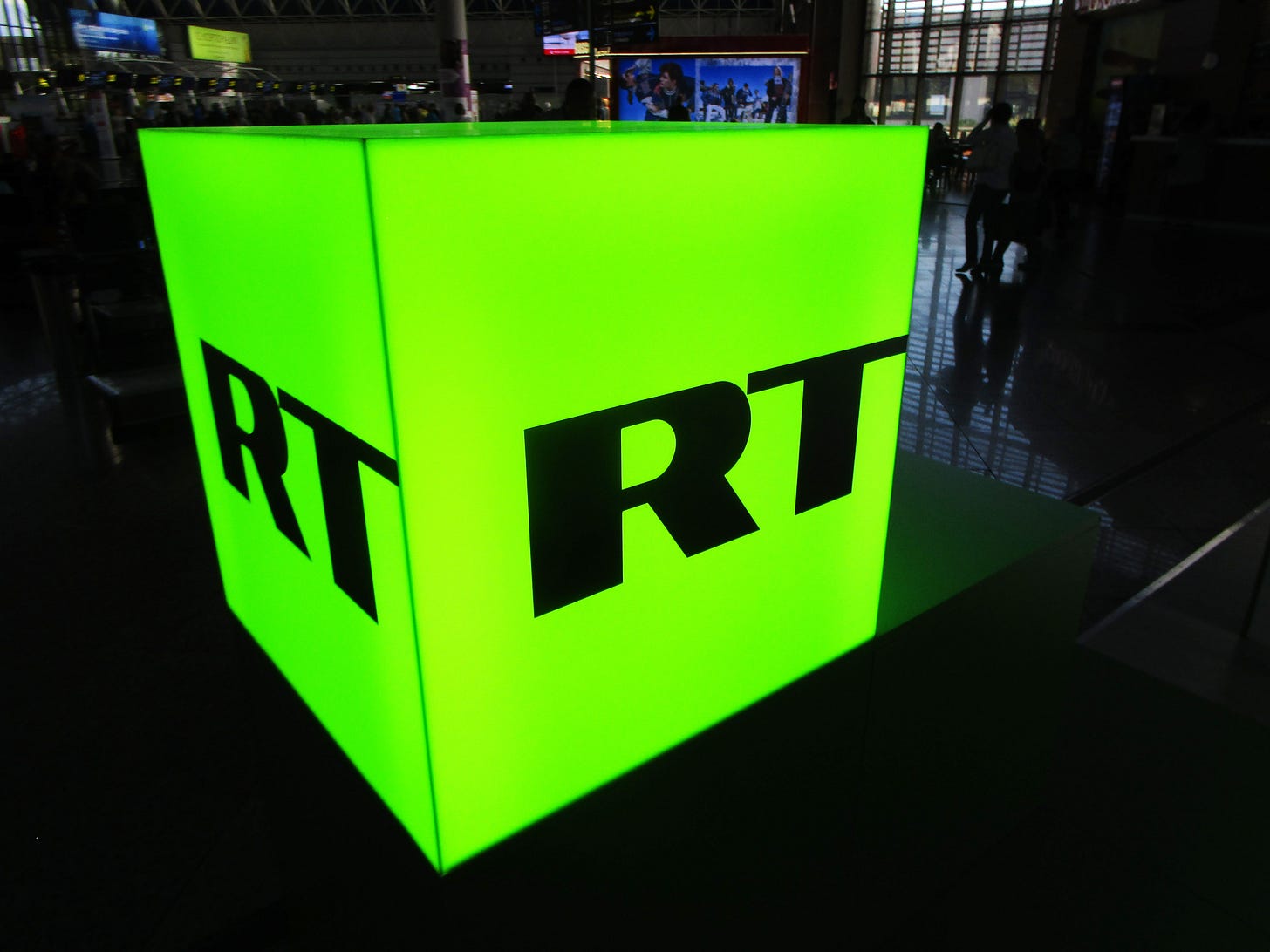Is RT Propaganda?
In defense of the Russian television network.
What constitutes propaganda?
Some describe right-wing news outlets like Fox and GB News as purveyors of propaganda, while others point a finger at the mainstream media.
In “The Media Very Rarely Lies” by fellow Substack-writer Scott Alexander, he argues that when media misinforms people, they do so through their choice of stories or by omitting context, he also exonerates both alternative and establishment media of intentionally spreading disinformation.
The article left me wondering: What about Russian media? Do they cross clear lines of deception that Western media doesn’t?
In this essay, we will explore these questions by taking a closer look at the Russian state-owned television network RT. Together, we will be asking: “is RT propaganda?”
The Case Against RT
Interestingly, the page about RT on Wikipedia has a summary panel categorizing the network as propaganda, with a footnote citing a variety of sources.

One of the sources cited is the chapter “Tools of Russian Influence: Information and Propaganda” from the book “Ukraine and Beyond” (2016), edited by Janne Haaland Matlary and Tormod Heier. The chapter was written by Geir Hågen Karlsen, a former Norwegian Army lieutenant colonel.
To the question “what is propaganda?”, it answers:
There are many definitions of propaganda, and most of them involve some of these elements: lack of truthfulness, exaggeration, bias, manipulation of emotions and use of strong or loaded expressions, omission of essential elements of the truth used for persuasion or deception. One widely cited definition is “the deliberate, systematic attempt to shape perceptions, manipulate cognitions, and direct behavior to achieve a response that furthers the desired intent of the propagandist”.
The chapter also accuses Russian media of inflaming hostility among the Russian minority in order to “undermine Baltic integrity”, as well as dividing the EU and Western countries.
In response to Russia’s 2014 annexation of Crimea, Liz Wahl resigned as a correspondent for RT America by going “off script” in the middle of a broadcast, saying she could no longer stand behind the channel’s coverage.

Later, Wahl appeared for a “debriefing” with Brian Stelter on his CNN show “Reliable Sources”, where she went into more detail about her time at RT and reasons for quitting.
On the show, Wahl tells Stelter that in an interview with former US congressman Ron Paul, she asked him how he could condone Russia’s intervention in Ukraine, given his record of opposing interventionism by the USA, but the question was edited out before broadcast.
Wahl also objected to the vilification of the Euromaidan protesters, through claims the pro-EU movement in Ukraine was infiltrated by neo-Nazis.

Roman Abalin is a Progressive Russian YouTuber running the channel NFKRZ.
In the video “Why You Shouldn’t Trust RT”, Abalin talks about an incident were Ruptly, a subsidiary of RT, allegedly presented a fake video about a New York restaurant creating a special burger in honor of Vladimir Putin’s birthday.
In the video, a young woman, seemingly seated at an outdoor table at a restaurant, shows off a huge hamburger, explaining how it was specially prepared in honor of Vladimir Putin, but according to multiple media outlets the story was false.

The Defense
The chapter by Geir Hågen Karlsen is mainly concerned with the content and effects of Russian “propaganda”, not the mindset of the people behind it. It talks about Russia’s goals and the narratives used to pursue them, but if anyone lied is often unclear.
The definition given of propaganda also includes techniques that don’t require the speaker to make statements they know to be false, for example exaggeration, manipulation of emotions and omission of important details.
These are in line with the subtly deceptive methods suggested in Scott Alexander’s article.
In Karlsen’s defense, establishing RT as a propaganda outlet, in the sense used here, probably wasn’t a goal of his book contribution, but we can still conclude that an influential text on RT doesn’t support the thesis we are investigating.
Liz Wahl resigned from RT, because she couldn’t support their coverage of events in Ukraine, but from her testimony in subsequent interviews, the issue seems to be one of disagreement with the editorial staff.
Editing out a question highlighting a double standard or inconvenient facts is not the same as knowingly presenting false information. It’s analogues to a news outlet prioritizing certain stories over others, like we talked about earlier.
Finally, Wahl never said she was required to lie deliberately and explicitly during her time at the network.
The Burger “Hoax”, allegedly perpetrated by Ruptly, was reported on by The Guardian and The Moscow Times.
The video introducing the Putin burger was filmed in 2017 at Lucy’s Cantina Royale, a NYC Mexican restaurant, by Darya Pauto and Tamara Ilizarova, two Russian-Americans confirmed to have been real employees at the restaurant.
Controversy erupted when Alexei Kovalev, a disinformation researcher, called the restaurant only to have them deny any knowledge of the campaign. The story became that Ruptly had contacted the two employees and tricked them into letting them come stage the video.
However, it seems the two employees came up with the idea for the video themselves and were the only ones involved in its production. This is implied in the Moscow Times article about the incident, where it says:
Two employees have been fired from a New York City restaurant after they created and filmed a “Putin Burger” in celebration of the Russian president’s birthday.
Later in the same article, Pauto is quoted as saying she was the one to come up with the special burger, which contradicts the notion she was put up to it by Ruptly.
That sentiment is reiterated in an “apology” video on her YouTube channel, where she says “the idea was really all mine”, she also never mentions Ruptly or RT.

While not stated directly, it looks like Pauto and Ilizarova submitted the video to Ruptly, because they were interested in having their school project-style film featured on the channel.
Ruptly aired the video without having visited the restaurant and not knowing the full context behind the clip.
In short, the Birthday Burger was real, but it was made as an employee “prank”, rather than an official tribute to president Putin, misrepresentations by Russian media were unintentional.
Conclusion
Having reviewed all this material, it seems evidence of outrageous deception by RT is harder to come by than one might expect.
Most faults in the channel’s content seems explainable as simply bias, comparable to that found in Western media, or honest mistakes.
The closest we came to seeing Russian “fake news”, as most imagine it, was the “Birthday Burger” video, but as we discovered, it was neither initiated nor “staged” by Ruptly/RT themselves.
I am going to conclude that RT isn’t a propaganda network, at least not more so than a typical cable news channel, and that Russian media can also be said to “rarely lie” in the sense meant by Scott Alexander.
Stay in touch by following me on X.


